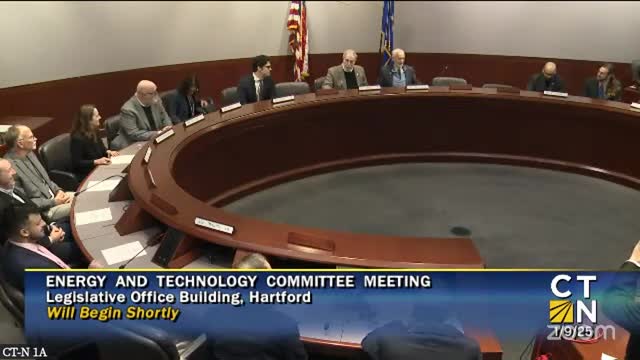Connecticut energy committee opens session stressing affordability, reliability and scrutiny of AI data centers
Get AI-powered insights, summaries, and transcripts
Subscribe
Summary
At an introductory meeting, the Connecticut Energy and Technology Committee’s leaders set priorities including affordability, grid reliability, energy efficiency and planning for new demand from AI data centers; no bills were taken up and no votes were held.
State Rep. Jonathan Steinberg, House chair of the Connecticut General Assembly’s Energy and Technology Committee, opened the committee’s introductory meeting by saying the panel will focus on “affordability” and a broad set of energy topics as the legislature begins its 2025 session.
The committee’s cochair, Sen. Needleman, said members must balance cost, reliability and environmental goals while preparing for new demands on the grid, including anticipated growth from AI data centers. Ranking senator Ryan Fazio said lawmakers on both sides of the aisle should seek bipartisan solutions to high electricity rates now burdening residents and businesses.
Steinberg told the committee it will consider a wide range of bills and hold multiple hearings. “We will talk about affordability because it's really critically important to those burdened by energy,” he said. Sen. Needleman framed the panel’s priorities as a three-legged stool of goals — reliability, affordability and environmental outcomes — and warned committee members that emerging demand from large computing operations is uncertain and potentially large: “I read, earlier this week that there's gonna be $2,000,000,000,000 worth of investment in AI data centers and AI in the United States in the next 5 to 10 years,” he said, adding the committee must ask where that electricity will come from.
Members emphasized energy efficiency, grid upgrades and transmission as immediate levers to reduce bills and improve reliability. Rep. Mashinsky noted Connecticut lags regional peers in deploying efficiency measures and urged the committee to use recently awarded federal funds for efficiency: “We are not using energy efficiency to the level that other states are using it,” Mashinsky said, and she referenced a roughly $100,000,000 federal grant the state received in July and a $25,000,000 state package from last year as resources to deploy.
Several members highlighted specific regional concerns. Rep. Andre Baumgartner pointed to Groton’s public-power utility, which delivered an 8.5% rate reduction to customers, and said local public-power examples should inform policy. Rep. Steve Winter noted his prior work using federal datasets and mentioned Federal Energy Regulatory Commission (FERC) and Energy Information Administration (EIA) sources as inputs for staff analysis.
On fuel and generation mix, viewpoints varied: some members identified nuclear and natural gas as necessary components of a reliable, near-term supply; others emphasized renewables, transmission expansion and efficiency as priorities. Rep. Dave Yacarino said he expects new technologies, including small nuclear modules, to be part of future supply options, while other members stressed public-health and air-quality considerations tied to generation siting.
The committee will use hybrid hearings and asked members to attend in person for floor votes, though Zoom participation will continue for informational sessions. Chair Steinberg said a calendar and hearing schedule will be circulated soon and announced the committee is planning one or more informational forums, including a combined informational on waste management issues to help new members get up to speed.
No formal motions or votes were taken at the introductory meeting. Staff and clerks introduced themselves and were identified as the committee’s principal points of contact for members and witnesses.
Looking ahead, chairs and ranking members said the panel will pursue bipartisan work on affordability, grid reliability, energy efficiency and planning for new large electricity demands. The committee adjourned after member introductions and a short scheduling discussion; the next meeting date was not finalized at the session.
